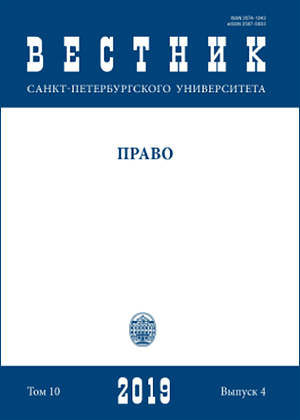Russian legal tradition
DOI:
https://doi.org/10.21638/spbu14.2019.413Аннотация
The purpose of this article is to discuss the traditional attitudes towards law which have been dominant in Russian society at different periods of its history. The article demonstrates the sources and causes of paternalism reinforcing the casual link between legality and obedience in the minds and practices of the Russian political authorities. Special attention is paid to the views on private property which took hold among the key Russian political thinkers of the late nineteenth and the early twentieth centuries, such as V. S. Solovyov and V. V. Rozanov, and the related state of the limited development of the Russian civil society in the late imperial era and throughout the Soviet period. In relation to this, an assumption is made that the attitude of the Bolsheviks to law and state was a crude form of continuing this contiguous tradition. In order to support these theses, a comparative analysis of the views of L. D. Trotsky and E. B. Khokhlov on the organization of labor during the first years of the Soviet regime is provided. The authors argue that the emergence of the early Soviet doctrine of the militarization of labor and the concomitant bureaucratic system of labor management was due to the authorities’ desire to centralize the distribution of factory production under the planned economy and the substantial public ownership of industry. A gradual change of social consciousness and practices during the recent decade — a trend that could not avoid affecting the current state of Russian legal studies and political thought — is thoroughly emphasized.
Ключевые слова:
law, state, paternalism, property, morals, labor, contract, coercion, freedom
Скачивания
Библиографические ссылки
Загрузки
Опубликован
Как цитировать
Выпуск
Раздел
Лицензия
Статьи журнала «Вестник Санкт-Петербургского университета. Право» находятся в открытом доступе и распространяются в соответствии с условиями Лицензионного Договора с Санкт-Петербургским государственным университетом, который бесплатно предоставляет авторам неограниченное распространение и самостоятельное архивирование.






